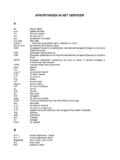Transcription of DEVELOPMENT OF CNG INDUSTRY IN PAKISTAN - …
1 HYDROCARBON DEVELOPMENT INSTITUTE OF PAKISTAN DEVELOPMENT OF CNG INDUSTRY IN PAKISTAN By HILAL A. RAZA Director General & CEO Hydrocarbon DEVELOPMENT Institute of PAKISTAN Global Perspective Compressed Natural Gas (CNG) has been used as a vehicle fuel for many decades. It is estimated that presently about 5 million vehicles are running on CNG worldwide, South America being the leader followed by Asia, Europe and North America. Since the technology for conversion to CNG so far has been perfected more for petrol than diesel engines, therefore, the number of diesel engine vehicles currently using CNG is much smaller than petrol. According to International Association for Natural Gas Vehicles (IANGV) statistics, more than seventy countries of the world are using CNG and PAKISTAN is ranked at after Argentina and Brazil. In Asia, PAKISTAN is leading the CNG using countries. Situation in PAKISTAN In view of short supply of indigenous liquid fuels, a great scope exists in the country for DEVELOPMENT of alternate fuels, especially natural gas that is locally available at low price while at the same time a widespread infrastructure for transmission and distribution of gas is already in place.
2 Research, DEVELOPMENT and demonstration efforts of Hydrocarbon DEVELOPMENT Institute of PAKISTAN (HDIP) have led to a successful programme of commercialization of CNG as a transport fuel in PAKISTAN . HDIP is now acting as a Technical Support Institution to regulatory authority Oil and Gas Regulatory Authority (OGRA). Commercialization of CNG in PAKISTAN The pilot projects of HDIP have been the fore-runners of large scale acceptance of CNG as a cheap and safe vehicular fuel in PAKISTAN . Both users as well as investors have been quite enthusiastic and responsive. As a result, 850 CNG Stations have become operational and 200 are under construction in more than 40 cities. Already more than 900,000 vehicles are running on CNG. An investment of billion has been made and investment of billion is in pipeline. The CNG INDUSTRY has created 16,000 new jobs.
3 Government Policy PAKISTAN has addressed issues related to awareness, technology, investment and institutional framework while pursuing rapid expansion of CNG INDUSTRY . The Government s concern to improve national economy by lowering the level of imports and improving environment has led to giving incentives for investors in CNG INDUSTRY . Some of these are highlighted in below. Strong government commitment to promote CNG use. Liberal approvals to obtain license for CNG retailing. Free market consumer price of CNG. Natural gas tariff for CNG linked to petrol. Priority of natural gas connection to CNG stations. Exemptions of import duty and sales tax on import of CNG machinery, equipment, kits and cylinders. The government has announced incentives for import of dedicated CNG buses. Government is also encouraging local manufacturing of CNG buses and other equipment in the country for sustainability of the CNG INDUSTRY .
4 Safety Aspects The CNG cylinders used as fuel tanks in the cars are seamless and made of special steel alloy. Additional safety is ensured through provision of a burst disc so that in the event of excessive high-pressure filling or fire during vehicle accident, this disc is ruptured and the pressure inside the cylinder is released. The Oil & Gas Regulatory Authority (OGRA) and the Chief Inspector of Explosives are looking after the standards and safety issues related to CNG conversion, dispensing and use. The HDIP is extending all technical support for inspection of CNG machinery and equipment and providing CNG cylinder testing facilities. It may be of interest to note that CNG is lighter than air, therefore, on leaking it immediately rises and dissipates into the atmosphere. Moreover, it has a narrower range of combustion (4 to 14 percent by volume) than petrol.
5 For these reasons, it is an inherently safer fuel than LPG or gasoline. Use of CNG increases the engine life as it does not contaminate or dilute the crankcase oil, extends the life of lubricating oil and plugs and decreases the rate of engine wear. Environmental Plus Environmentalists recommend fuel switching from liquid fuels to natural gas as a strong measure to protect environment. CNG is lead-free fuel with no sulphur and particulate emissions and 1/10th level of carbon monoxide emissions as compared to petrol. Thus CNG is a highly environment friendly motor fuel for improving ambient air quality. It also produces much lower carbon dioxide emissions as compared to petrol and diesel oil thereby helping in mitigating global warming effect caused due to greenhouse gas emissions of carbon dioxide. Diesel to CNG Conversion Strategy PAKISTAN is importing more than million tonnes diesel oil annually at a cost of around US $ billion.
6 The air pollution caused due to use of diesel oil is also very severe. Therefore, there is a strong need for replacing diesel oil to the extent possible with CNG. The techno-economics of converting diesel engines to CNG, however, are not very attractive due to high conversion cost, little differential in the price of diesel oil and CNG, and several engineering and management problems related to conversion of bus fleets. In order to address these problems, the Government is working on a programme which will start initially in federal and provincial capitals where dedicated CNG city-buses will be put on road. The programme will then be extended to cover other urban centers on transport pollution basis. The programme will also include infrastructure DEVELOPMENT and manufacturing of dedicated CNG buses.
7 Our policy is to promote a market driven industrial DEVELOPMENT of the CNG INDUSTRY rather than through administrative directives. This programme will have a major impact on air quality of the urban areas which will improve health standards of our people and in turn save billions of rupees spent on health care. Conclusion Following the pioneering research, DEVELOPMENT and demonstration efforts of the Hydrocarbon DEVELOPMENT Institute of PAKISTAN (HDIP), the commercial use of CNG in petrol vehicles has been successfully implemented in PAKISTAN . The CNG technology has received widespread public acceptance and investor confidence. A high demand for CNG fuel exists countrywide. Substantial foreign exchange saving potential exists in diesel to CNG replacement. A strategy of inducting dedicated CNG buses in place of diesel buses together with installation of fleet CNG stations needs to be pursued.
8 It is highly desirable that the CNG INDUSTRY should focus their efforts on indigenization of CNG equipment like CNG conversion kits, cylinders, compressors, dispensers etc. to meet the demand of CNG growing INDUSTRY . If such facilities are established in PAKISTAN we may also be able to access the international markets especially in neighboring countries. Replacement of liquid petroleum fuels with CNG is a major step towards protecting environment, especially in urban areas where air pollution is fast becoming a menace. _____








